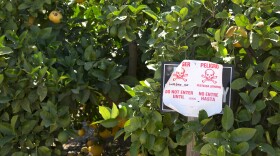Eilís O'Neill
Year started with KUOW: 2017
Eilís O'Neill is the EarthFix reporter at KUOW. Eilís (eye-LEASH) fell in love with radio as a 14-year-old high school intern at KUOW. Since then, she’s wandered the world recording people’s stories and telling them on the air. She’s worked at KALW in San Francisco and WAMU in D.C.; she’s freelanced for public radio programs such as The World and Marketplace from places such as Buenos Aires and Santiago de Chile; and she’s written for The Nation and other magazines.
Eilís has a degree in English and Spanish from Oberlin College and a master’s degree in science, environment and health journalism from Columbia University.
-
Researchers at the University of Washington are investigating whether psychedelics could alleviate depression in healthcare workers. The pandemic saw record burnout among doctors and nurses.
-
Some COVID-19 patients still haven't fully recovered, months after their initial diagnosis. These long-haulers struggle to find care. Now clinics are beginning to offer them treatment.
-
Millions of children are taking classes online because of the coronavirus pandemic. But for families who live in homeless shelters, it's more than just inconvenient. It's overwhelming.
-
Among Native Americans, asthma rates are high, and those with asthma end up in clinics more often, miss more school and work, and are more likely to die from the condition, according to the CDC.
-
In Washington state's Skagit Valley, a conflict is unfolding between Native Americans and farmers. Elk are making a comeback there. Local tribes are thrilled, but the agriculture industry is not.
-
Chlorpyrifos has been linked to developmental delays in kids and other health problems. The EPA is fighting a lower court's ruling that it must ban the pesticide, which farmers say they need.
-
Bees have been dying in unprecedented numbers. A new study has found that fungi-destroying chemicals may make it harder for bees to metabolize their food. And if they can't get energy, they can't fly.
-
Researchers have developed a new wheat-like species called Salish Blue that grows back year after year, which not only cuts down on work for farmers, but helps prevent erosion and agricultural waste.





